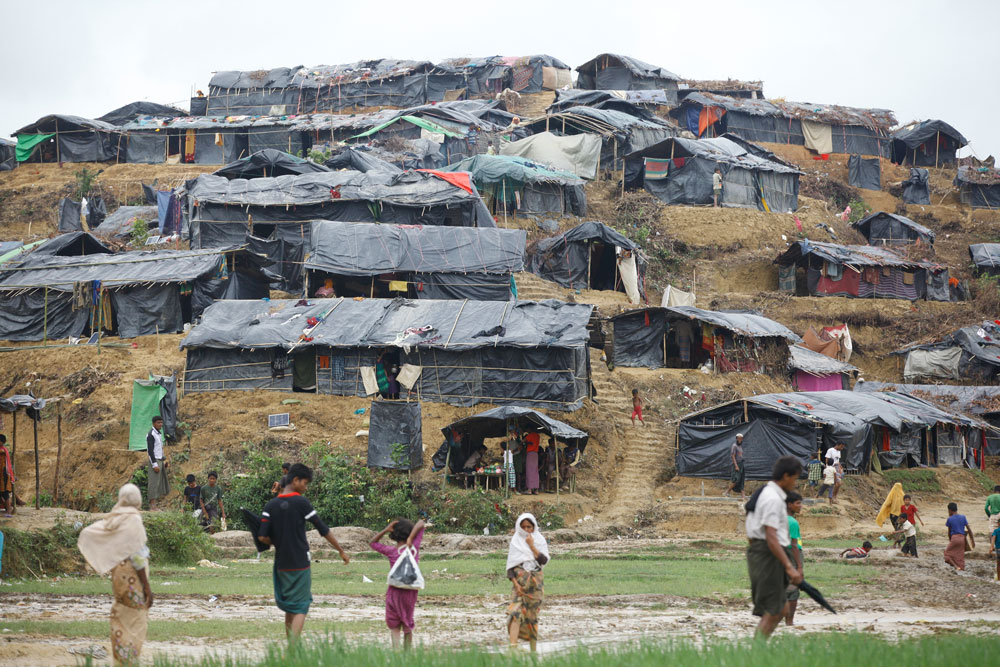The evolving Rohingya issue is finally gaining momentum internationally
The dynamics pertaining to the issue of Rohingya Muslims has continued to come to the forefront of international attention. This has become particularly significant since November 11 this year.
The United States, Canada, the European Union, and the Organization of the Islamic Cooperation have been jointly addressing this issue in different fora — both in Geneva, The Hague, and in New York.
They have condemned continuing serious human rights violations and abuses across Myanmar and underlined that Myanmar authorities need to deepen democratic reforms and ensure accountability for those responsible for human rights violations.
Legal developments on the Rohingya crisis have also gained international spotlight, because of the International Criminal Court judging on November 14 and approving a request from prosecutors to open an investigation into crimes committed against Myanmar’s Rohingya Muslim minority.
The court stated that a panel of judges who studied Prosecutor Fatou Bensouda’s request to open an investigation concluded that there are grounds to believe that widespread acts of violence were committed “that could qualify as crimes against humanity and persecution on grounds of ethnicity and/or religion against the Rohingya population.”
This decision came just days after the government of Gambia accused Myanmar of genocide in proceedings initiated at the International Court of Justice and Rohingya activists filed a lawsuit in Argentinean Courts.
This has led Nicholas Bequelin of Amnesty International to observe that “while we welcome today’s decision, it only allows the ICC to investigate some of the military’s many crimes against ethnic minorities in Myanmar.
This is why it remains essential that the UN Security Council refers the situation in the whole of the country to the ICC. Its ongoing failure to do so is a stain on its credibility and an abdication of its responsibilities.”
As expected, Myanmar, because of its strong backing from China and Russia, has rejected the possibility of the ICC probe over its alleged crimes.
On November 15, 2019, Myanmar government spokesman Zaw Htay branded an investigation by the International Criminal Court (ICC) “not in accordance with international law.”
It would be important however, to note at this point that though Myanmar has not signed up to the court, the ICC has ruled last year that it has jurisdiction over crimes against the Rohingya because Bangladesh, where they are now refugees, is a member.
It would be significant to observe here that Canada also showed the value of its leadership in the International Court of Justice.
This was consistent with their earlier course of action undertaken in 2018.
At that time, the Canadian parliament led the international community with its determination that the situation in Myanmar was indeed “genocide.”
This time round, Canada, Gambia, and the OIC have used the denotation contained in Article IX of the Genocide Convention that calls for a submission to be made to the International Court of Justice in case of a dispute between contracting parties relating to the interpretation and application of the Genocide Convention.
Canada might further Gambia’s efforts by becoming a party to the action, or Canada can intervene positively in support of a strong adjudication regarding Myanmar’s systematic state-sponsored sexual violence as genocide.
From that context, demand for reparations could be made for the still suffering rape victims in the Rohingya refugee camps in Bangladesh and villages in Myanmar. Canada’s support to the action at the International Court of Justice will help to restore confidence in a rules-based international order and also bring hope to the remaining genocide survivors.
A necessary resolution
It needs to be understood that the resolution that was discussed in this committee and was subsequently voted upon addressed not only the human rights of the Rohingya community, but also underscored deep concern at the human rights violations and abuses perpetrated by Myanmar security and armed forced against minorities in the Rakhine, Kachin, and Shan states.
Reference was made in this regard to the detailed findings — of women, children, and men witnessing many forms of violence — by the Independent International Fact-Finding Mission on Myanmar.
The resolution called for redress and justice for the mass atrocities and crimes against humanity, and also urged the operationalization of the Independent Investigative Mechanism.
Whereby the International Fact-Finding Mission would be given the means and necessary access to play its crucial role in ensuring accountability for those responsible, in particular, collecting, consolidating, preserving, and analyzing evidence of the most serious international crimes and violations of international law committed in Myanmar since 2011.
The draft resolution named “Situation of human rights of Rohingya Muslims and other minorities in Myanmar” was placed in the UNGA by the United Arab Emirates and Finland on behalf of the Organization of Islamic Cooperation (OIC) and European Union (EU). It was passed by a majority of 140 votes. Nine countries voted against the resolution and 32 countries abstained.
The draft will now go to the full session of the UNGA for voting — if needed — before the resolution is adopted by the UNGA.
Bangladesh Permanent Representative to the UN Masud Bin Momen, while thanking the international community for their support, also expressed his hope that they will ensure quick implementation of this resolution.
He also correctly drew attention to the observations made recently by Prime Minister Sheikh Hasina earlier this year, where she urged the world community to demonstrate clear political will and persuade Myanmar to agree to the deployment of civilian monitors as confidence builders in the Rakhine state.
This would then facilitate the creation of a conducive environment among the affected Rohingya, and ensure their safe and sustainable return to Myanmar.
This story was originally published by Dhaka Tribune, Bangladesh
